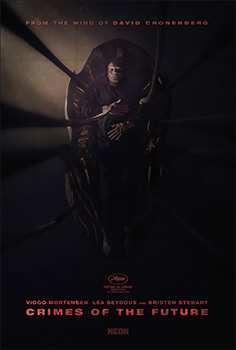The History of Future Crimes
by Thom Ernst – Film Correspondent
(June 3, 2022 – Toronto, ON) It’s not Cronenberg’s fault that I’m confused by Crimes of the Future. The world is never as I expect it when skewed through the eyes of David Cronenberg. What I find harder to come to terms with is how Crimes, derivative of so many other Cronenberg films, seems disinterested in forging any significant connection with the audience.
Undoubtedly, there will be those who’ll revel in Cronenberg’s obscure vision, proudly embracing the film’s inaccessibility as being refreshingly ambiguous. And I wouldn’t think to argue them out of that opinion. I would only concede that Crimes of the Future is one of the most divisive of Cronenberg’s works, and with Cronenberg, that leaves a lot to choose from.
Crimes is high-brow horror that plays to an arthouse crowd who don’t rely on jump scares and body counts to stoke their dark imaginations. Enthusiasts will recognize Naked LunchNaked Lunch, The Fly, eXistenZ, Dead Ringers, Crash, and Videodrome elements in this latest entry of the director’s oeuvre of body horror. The similarities with these films are not just in themes of physical transformations and the merging of technology with the body but also in set and art design. It’s fun to watch Crimes and connect the dots with other Cronenberg films.
Cronenberg regular Viggo Morgenstern (History of Violence, Eastern Promises) stars as Saul Tenser. Tenser and his partner Caprice (Léa Seydoux) exploit a growing disease called Accelerated Evolution Syndrome to thrill their audience (a similar kind of arthouse crowd that would appreciate a Cronenberg film) by removing synthetically modified internal organs. The artistry of their performance is not so much the harvesting of the organs, although that does fuel a kind of giddy gross entertainment, the deformity of the organ itself.
 The duo’s avant-garde performances draw the attention of Wippet (Don McKellar) and Timlin (Kristen Stewart), two bureaucrats from the National Organ Registry whose job is to keep tabs on newly developed organs. Others entering the scene is an organization (led by Scott Speedman) that has developed the first naturally born synthetic human (albeit one who is driven to eat plastic) and two coyly seductive assassins (Nadia Litz and Tanaya Beatty).
The duo’s avant-garde performances draw the attention of Wippet (Don McKellar) and Timlin (Kristen Stewart), two bureaucrats from the National Organ Registry whose job is to keep tabs on newly developed organs. Others entering the scene is an organization (led by Scott Speedman) that has developed the first naturally born synthetic human (albeit one who is driven to eat plastic) and two coyly seductive assassins (Nadia Litz and Tanaya Beatty).
Surgery is the new sex, one character acknowledges, so when the opportunity for “traditional sex” is presented to Tenser, he cannot respond.
Like Crash (1996), Cronenberg’s take on J.G. Ballard’s visionary science fiction novel, Crimes of the Future, assumes a relationship between sexual desire and open wounds. And Cronenberg is only too happy to push the narrative with graphic images of surgery, autopsies, and voyeurism.
There’s a history to the movie that matters more if you are a film student or an avid consumer of arthouse cinema. If you are privy to the insight of Canadian film critics and historians, you might be aware that it’s been Cronenberg’s intent to revisit the film. There is a version of Crimes that came early in his career, 1970 to be exact. I have not seen the original, so I don’t know if the decades between better serve the story. But I can hope (and I do) that Cronenberg is happy to have finally got around to the remake.
![]() Thom Ernst is a Toronto based film critic and writer and an active member of the (TFCA) Toronto Film Critics’ Association. His work has appeared in various publications including Playback Magazine, The Toronto Star, and The National Post. He is known to CBC Radio listeners for his lively contributions to Fresh Air, Metro Morning, and CBC Syndication as well as appearing on-air for CTV News Channel and The Agenda with Steve Paikin. He was host, interviewer and producer of televisions’ longest running movie program Saturday Night at the Movies. Currently he can be heard interviewing Canadian filmmakers on the Kingston Canadian Film Festival podcast, Rewind, Fast-Forward.
Thom Ernst is a Toronto based film critic and writer and an active member of the (TFCA) Toronto Film Critics’ Association. His work has appeared in various publications including Playback Magazine, The Toronto Star, and The National Post. He is known to CBC Radio listeners for his lively contributions to Fresh Air, Metro Morning, and CBC Syndication as well as appearing on-air for CTV News Channel and The Agenda with Steve Paikin. He was host, interviewer and producer of televisions’ longest running movie program Saturday Night at the Movies. Currently he can be heard interviewing Canadian filmmakers on the Kingston Canadian Film Festival podcast, Rewind, Fast-Forward.


